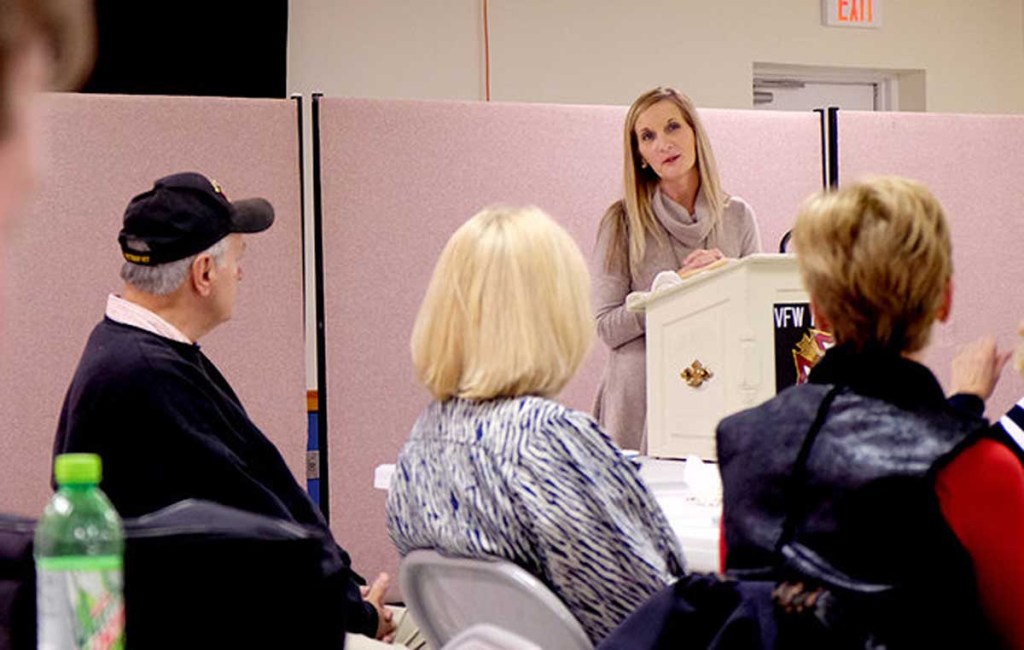Eyes & ears: City workers learning to spot signs of human trafficking
Published 5:15 am Saturday, December 28, 2019

- Kathy Wilson outlines the local effects of human trafficking during a Jan. 2017 meeting of the Cullman County Republican Women.
Beginning in 2020, city of Cullman employees will receive training on spotting the signs of human trafficking. The city is one of the first TraffickingFree Zones in the state of Alabama, joining Birmingham and four other cities in the Birmingham area to adopt the designation.
The TraffickingFree Zone initiative is a nation-wide program of the U.S. Institute Against Human Trafficking and local anti-trafficking coalition, the Child Trafficking Solutions Project, an initiative of the Children’s Policy Council and the Jefferson County Family Court. A proclamation signed by Cullman Mayor Woody Jacobs requires all city staff to receive training, and for the city to adopt a “zero-tolerance” policy regarding purchasing commercial sex at work. According to Jordan Giddens, community engagement coordinator for the Child Trafficking Solutions Project, research shows the peak time for people to purchase commercial sex is between 11 a.m. and 2 p.m.
The training city employees will receive is provided primarily by the U.S. Institute Against Human Trafficking and is available online. Cullman County Human Trafficking Chair Kathy Wilson joined with the coalition to bring the TraffickingFree Zone to Cullman.
“The City of Cullman has always taken the issue of human trafficking, and specifically child trafficking, very seriously,” Wilson said. “We were one of the first counties in the state to form a human trafficking task force, and we are excited to join other Alabama cities in taking this vital step to show the community how seriously we take this issue.”
The Cullman County Human Trafficking Task Force was created in 2015, and since that time, three human trafficking cases have been made. Wilson said that shows that people are becoming more aware of the issue of trafficking. “Our goal is to find the people who are doing it and keep people educated so they know what to look for,” she said.
According to the Department of Homeland Security’s Blue Campaign, some indicators of human trafficking are:
- Does the person appear disconnected from family, friends, community organizations, or houses of worship?
- Has a child stopped attending school?
- Has the person had a sudden or dramatic change in behavior?
- Is a juvenile engaged in commercial sex acts?
- Is the person disoriented or confused or showing signs of mental or physical abuse?
- Does the person have bruises in various stages of healing?
- Is the person fearful, timid or submissive?
- Does the person show signs of having been denied food, water, sleep, or medical care?
- Is the person often in the company of someone to whom he or she defers? Or someone who seems to be in control of the situation, e.g., where they go or who they talk to?
- Does the person appear to be coached on what to say?
- Is the person living in unsuitable conditions?
- Does the person lack personal possessions and appear not to have a stable living situation?
- Does the person have freedom of movement? Can the person freely leave where they live? Are there unreasonable security measures?
Anyone who suspects human trafficking activity is asked to call either the National Human Trafficking Hotline at 1-888-373-7888 or text HELP to BeFree (233733), or call the Department of Homeland Security’s trafficking hotline at 1-866-347-2423.


